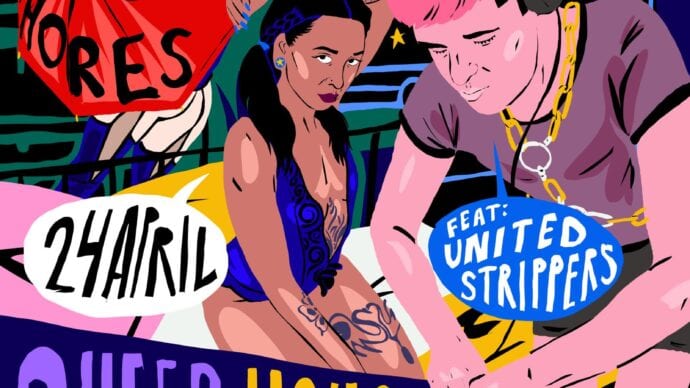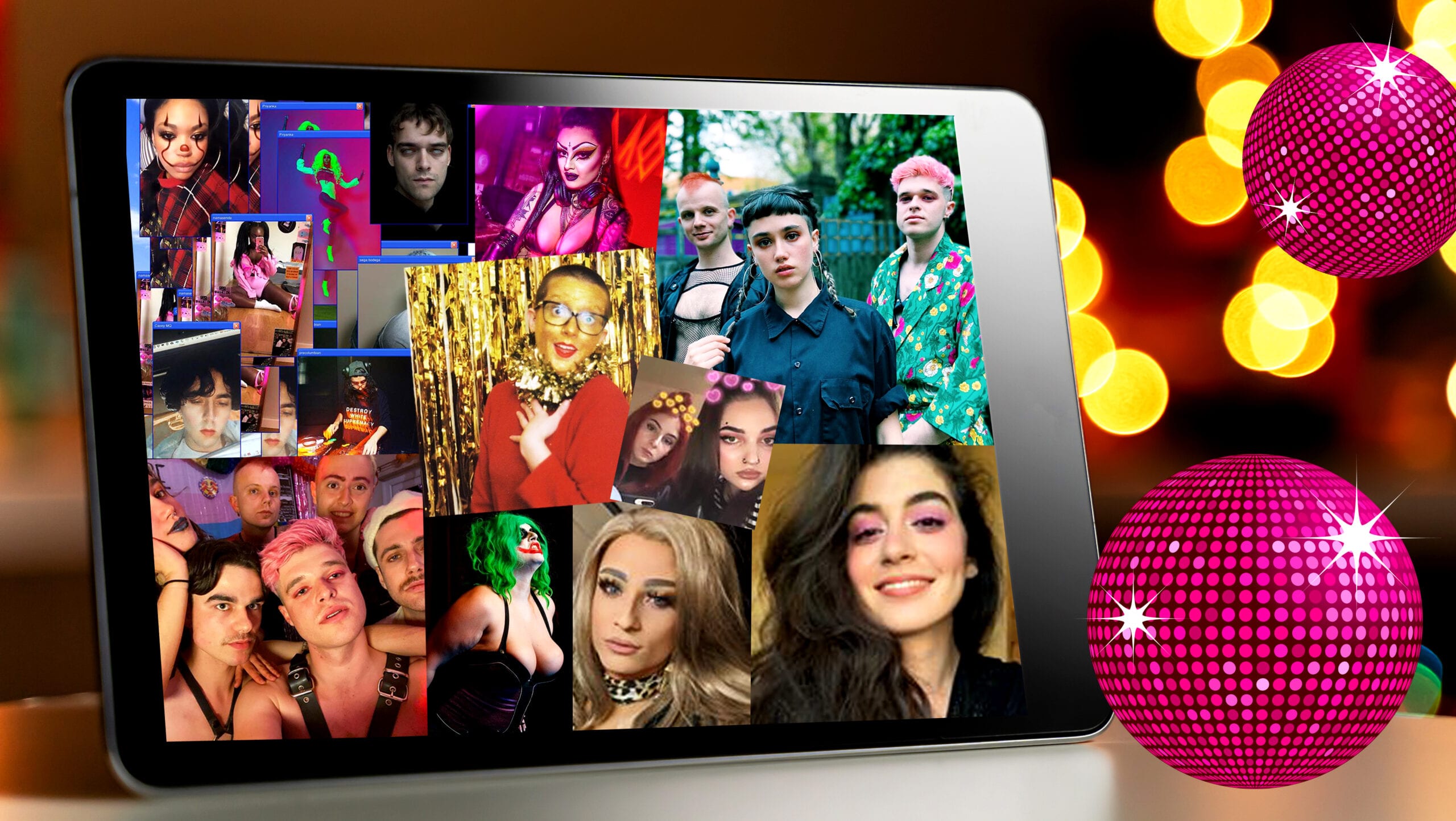Many queer people are itching to find a digital space where they can get their groove on. Groups of tech-savvy queers are managing to unite LGBTQ2 people by building IRL to URL dancefloor experiences and taking the party to the next level. For this generation of LGBTQ2 clubbers, nightlife isn’t what it used to be; it’s better. Since self-isolation directives due to the COVID-19 pandemic were implemented in early March, LGBTQ2 DJs, club performers and party promoters have had to adapt to new online platforms quickly, spreading the word via social media and throw together parties with little or no cover charge and no budget to speak of. These vanguards in Toronto, Los Angeles, London and beyond have been working around the clock to book performers, create setlists and construct dynamic visuals each night. Toronto-based Club Quarantine, an internationally-attended queer dance party hosted nightly on Zoom, has managed, in the first few weeks of its existence, to secure guest DJs like pop star Charlie XCX as well as collaborate with Paper magazine. Beyond the buzz and booming interest, Club Quarantine’s organizers artists Ceréna Sierra and Casey MQ, along with comedian Brad Allen and digital artist Mingus, acknowledge that the club was created out of necessity. “As queer people, we know that the club has been one of the only true safe spaces out there,” says co-founder Sierra. “In the past, people who identify as LGBTQ2 felt they needed this kind of shelter to express their sexuality, freedom and identity. So when you start to eliminate queer clubs, you start erasing who we are as a community.”
![]()
Present-day queer club culture can be traced back to the discos, vogue balls, house parties and circuit raves of the 1970s, ‘80s and ‘90s. These events had their own underground star systems, teaming with gender-blending performers and clubland fixtures. These party spaces were some of the first to raise money and awareness for LGBTQ2 causes. When the HIV/AIDS pandemic hit, they offered a sense of escape for a community confronted with fear and ignorance. The music in these spaces, specifically house and disco (which still manages to inspire today’s music scene) became the soundtrack of queer liberation. Anthems that rolled out of club speakers spoke to the trials and tribulations of having to mate and love on the fringes of society. “Many of us who identify as queer know what it’s like to live, create and love in the underground because that’s where we’ve been pushed to for so long,” Sierra says. “Now we’re faced with having to recreate that space again, but this time it’s for a community who is feeling a sense of longing that goes beyond being unaccepted.”
“We’ve seen goth guys and full-on drag queens, babies, ferrets, snakes and turtles, you name it.”
Sierra says that, during the COVID-19 pandemic, queer people are looking for human connections, love, friendship and even cybersex. This moment’s added layer of anxiety gives the search for like-minded people extra urgency. Club Q, according to Sierra, is a space that respects the past but thrives on promoting inclusivity. “Club Q is not about bottle service or exclusion or VIPs or anything that stops people from feeling embraced,” they say. Mingus, another of Club Q’s organizers, says people are used to the dark side of the internet and, for a certain generation, the web is synonymous with the “scary chat rooms” of [webcam-based website] Chatroulette. He says Club Q wants to do the opposite of that. Sierra, Mingus and other Club Quarantine organizers’ devotion to its core audience is paying off. The surplus of looks—from dressed-up high glam people to couples in stripper gear—served nightly at the event is an indication of the effort being put in by the crowd. “We’ve seen goth guys and full-on drag queens, babies, ferrets, snakes and turtles, you name it,” Casey MQ says. “The outfits keep getting better.” Club Q has become so big that, according to the organizers, there have been repeated requests for the club to set up a separate digital dark room.
https://www.instagram.com/p/B_OfIl3gnKX/?utm_source=ig_web_copy_link
But Club Quarantine is not alone. Popular online dance parties catering to LGBTQ2 crowds have followed CQ’s lead, including Hunhouse (Toronto), Disco Distance and Dancing On Our Own (Los Angeles), Quarankiki (Chicago) and Queer House Party (London). But no other independent online collective has yet to match the skyrocketing attendance of Club Quarantine, which has gone from a meager 40-per-night crowd to an extraordinary 4,000-plus turnout. What is most impressive is that some of the guests turning the beat around are actually zooming-in from parts of the world where being out and proud is not an option. This includes the Middle East, Egypt and parts of Africa. Mingus says although Club Quarantine was created because of community quarantine, it’s existence opened a bigger conversation about issues that predate quarantine: Who belongs and feels comfortable in queer dance spaces? “They might not be able-bodied, or they might be closeted or feared that if they told people who they are, they could be jailed or ostracized,” Mingus says. He and other Club Q organizers hope to build on what they have learned when the party goes offline. “When this pandemic is over, we will do this event live,” he says. “But we’ll think of all the queer people that really need this space and make it better for them—as well as performers—who, presently, see virtual spaces as their only option to express.”
![]()
One performer who is energized by clubland’s recent transformation is New York-based singer/songwriter and DJ Nomi Ruiz. “This all reminds me of what clubs used to be like when I first started to go out dancing,” she says. “It’s making me think about what kind of virtual club moment I’d be into making.” As a member of two dance music supergroups—Hercules and Love Affair and Jessica 6—Ruiz has been a firsthand witness to how queer clubs have changed over the past two decades. In her early clubbing days in New York as a young trans woman, Ruiz says queer clubs were the only places she saw trans women in a position of power. “These trans women were goddesses in the club, controlling the guest list, performing or promoting their own nights,” she says. “They were free and had the kind of autonomy I think I needed to see as a young kid. Now, with digital clubs, you can reach more people who were like me, who need to see that people like them are creating or DJing or performing. But now it’s on this world stage, not a local one.” Ruiz says the new generation’s use of the digital world to experiment and test things out is inspiring her and making her evaluate how she can present her work. Ruiz’s tracks such as “Desire,” “Inside,” “White Horse,” “Prisoner of Love” and, most recently, “Cocaino” all grew out of creative feedback that she received in clubs. For her next single, Ruiz hopes to launch it via a live streamed party from an abandoned club in Brooklyn. “With a digital club, I can still taste-test my own tracks with a crowd,” she says. “That way I get a feeling of what the community is into the most and it gives me a chance to go back and [amplify] what made them lose their shit when they were dancing.”
“This all reminds me of what clubs used to be like when I first started to go out dancing.”
Like Ruiz, dance music singer/songwriter Cédric Gasaïda is also feeling motivated by club culture’s online rebirth. The Rwanda-born, Toronto-raised and Moscow-based artist, who also goes by the name Starving Yet Full, has been using social media platforms to replicate an at-home club performance, posting his “quarantune” of the night where he sings over tracks of club-driven songs. Gasaïda says it was only a matter of time before the inspiration he feels when going to a real club was replicated online. He says he’s glad that it’s all happening online and not forgotten because performers need stages, but they don’t necessarily need to be physical ones. “If you’re around expressive people, you’ll be expressive by osmosis,” Gasaïda says. For his soon-to-be-released album, he is now considering a virtual club tour. “We need to start making lemons out of lemonade,” he says. “That means still trying to connect to each other through this mess in new ways.”
![]()
Queer House Party (QHP), another Zoom-hosted club, shares Ruiz’s and Gasaïda’s focus on creative connections. Run by six queer, anti-fascist DJs who live in a flat together in southeast London, QHP happens every Friday night. The party’s split screen includes Wheelie Queer Mer Babe, a self-described queer, poly, disabled, autistic radical socialist who signs diva anthems, hip hop hooks and translates full-on drag performers from her wheelchair. Followed by such luminaries as fashion designer Gareth Pugh, QHP will be featured in an upcoming documentary about queer activism in the face of COVID-19. One reason the party is getting so much attention is because of its main purpose: To raise funds for queer and trans people in the U.K. experiencing homelessness, and to help fellow club performers with rent money. “We are all about booking queens and queers that are down on cash so we can tip them,” says QHP founder and DJ Harry Gay. “We know the reality of what is going on in the U.K. so we’d like to be a part of the change since one in four young people who are homeless identify as LGBTQ.” The club’s lineup has included some international names—drag performers such as Lynks Afrikka and Vinegar Strokes (of Rupaul’s Drag Race UK fame) have both signed on—but Harry says QHP’s main focus is to give the stage to queers without throngs of followers or mainstream appeal. They’ve also teamed up with other groups, like the strippers union United Strippers of the World.

“We like performers who are more DIY, grassroots, down-to-earth and glitzy in the right ways. There’s a loop vocalist called Xana that we just booked who is incredible and you wouldn’t see them on a mainstream queer stage,” Gay says. “Queer, underground performers rarely have a shot at getting the exposure they deserve because they wouldn’t be booked in the mainstream… that’s why it’s special to us and we need to keep it going.” Queer House Party’s community-first approach is music to club-aficionado Charles Pavia’s ears. As a person who has been clubbing in different cities and LGBTQ2 spaces for more than three decades, Pavia feels that the pandemic has made us think about where and how we dance together in a challenging and thoughtful way. “The [pandemic] has reminded people just how important and relevant the idea of a club is to our community,” Pavia says. Part of what seems to be getting updated, with regards to this new sweep of online parties, is how LGBTQ2 patrons are asking for more than what previous generations of queers had. Pavia says the fast-changing taste on the dancefloor is reflective of what’s going on in the community. The new generation of clubbers, according to Pavia, views the world in a non-hierarchical way. “They are fighting the heteronormative establishment and understand that we are not in an equal world,” Pavia says. “They want to make spaces that come close to a certain ideal.” Another party making real the ideal is Club Hunhouse, a relatively new online event hosted on Zoom, which was devised as an homage to Toronto’s long-closed queer dive bar called Henhouse. Curated, organized and produced by four queer women—DJ NO COPS, filmmaker Lulu Wei, DJ Sophie Jones and community manager Soji—Hunhouse stands as more than just a night of nostalgia. The party was mainly created for a group of people that felt they were getting lost in the Club Quarantine crowd. “We were part of the first small audiences that Club Quarantine had before it blew up,” Soji says. “We started noticing that space was lessening for a lot of queer women—they felt a little pushed out.” Plus ça change. The dearth of queer women’s spaces long predates the pandemic.
“We decided to provide a space where people who might not necessarily feel like they’re ready to go play at a club could have their debut.”
The Hunhouse team also decided that the featured talent would reflect the party-goers, so they started to think of the online club as an talent incubator for those who are spinning on the fringes. “A lot of women DJs and queer women and trans and non-binary folks might have a hard time breaking into the club scene and DJing,” DJ NO COPS says. “We decided to provide a space where people who might not necessarily feel like they’re ready to go play at a club could have their debut.” To bring home the community aspect of the event, the Hunhouse team paired up with the COVID-19 Prisoner Emergency Support Fund, a charity which helps support previously incarcerated individuals re-entering the community, as well as the families of those who are still behind bars. Guests of Hunhouse have the option to donate when they enter the club through Zoom. “It’s really nice to not have the financial pressure part of it,” Wei says. “I know a lot of physical bars and spaces have to make so many sacrifices to keep going whereas we can just keep our vibe as authentic as possible.” Sonic and cultural diversity is another priority for Hunhouse. “We don’t want to just play clubby tracks or have the same approach of a standard club,” DJ NO COPS says. “We’re just blown away that people in Australia are sharing the space with women who are zooming while performing in aerial silks—it’s that kind of space.” To keep the lineup as fresh as the crowd, Club Hunhouse has extended its mandate beyond music, devoting time for karaoke and comedy stand-up routines. A plan is in the works to start speed dating in breakout rooms before the DJ sets begin. Queer nightlife continues to evolve during the COVID-19 pandemic. Common among all these fledgling club creators is the goal of turning their parties into hubs for deep connection. “We hope we can facilitate people finding love during this quarantine,” DJ NO COPS says. “Queer people know this more than anyone: There’s no better matchmaker than a dancefloor.”
![]()
Want to hear more? Check out these organizers from Club Hunhouse.
![]()


 Why you can trust Xtra
Why you can trust Xtra


